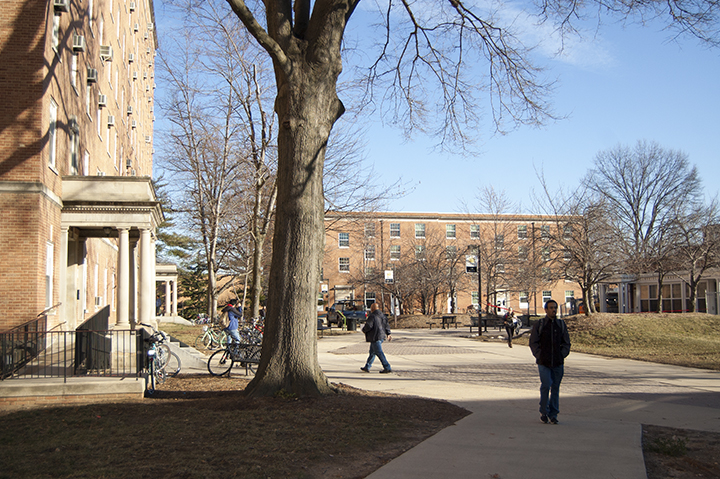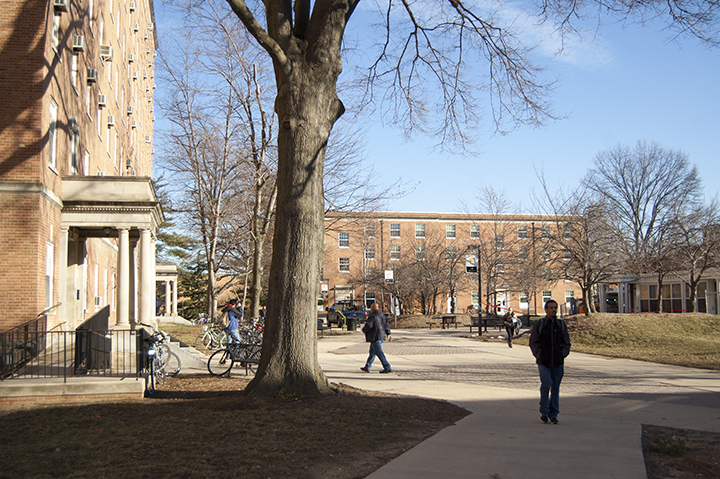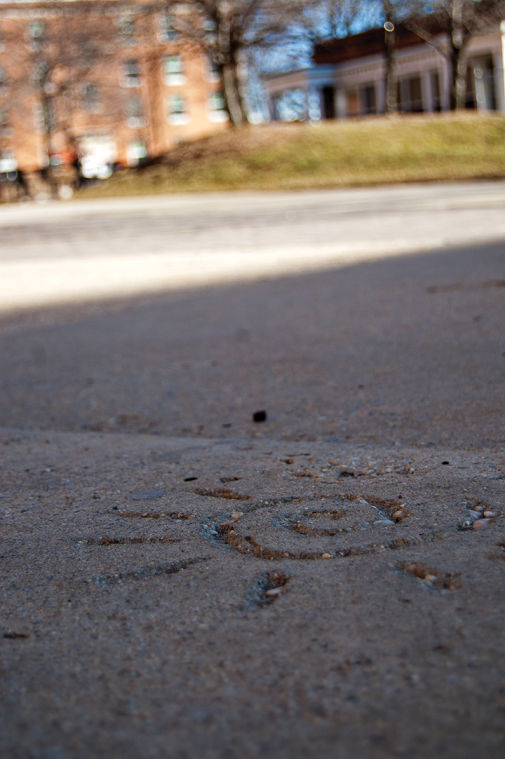The Cambridge Community Center, at the center of five dorms, has been host to many College Park Scholars courses for most of the living-learning program’s 20-year existence. But next year, the way members of the different programs are assigned housing will be changing.
Scholars is reorganizing its living structure into “neighborhoods” next year based on student comments in evaluations that reflected a desire to expand connection opportunities, said David Eubanks, associate director. Scholars and alumni of the programs are still being used to shape changes in the community, Executive Director Greig Stewart said.
“Something we hear pretty often is that students would like to be able to do more with Scholars from other programs,” Eubanks said. “And it occurred to us that there are some structural connections across programs.”
Each neighborhood will contain three or four Scholars programs and students will be assigned to certain buildings, but room assignment will not be dictated by program or floor as it has been in the past, allowing for more housing flexibility, said Scott Young, Resident Life assistant director.
Austin Adams, a sophomore mathematics major and Public Leadership Scholar, said he never really got to interact with students in other programs and most of the people in his program were pretty similar to him. He thought the neighborhoods structure would be a nice way to meet and work with new people with different personalities.
The new structure will allow for greater interaction and collaboration across similarly-focused programs and hopefully create new research and internship opportunities as well, Eubanks said.
Brought to campus in 1994, Scholars has allowed the members of each program to live on the same floors of the same dorms.
“[The community] was really one of the best parts,” said Kurt Rubenacker, a junior civil and environmental engineering major and alumnus of the Media, Self and Society scholars program. “It’s such a large campus, but you really had a network right when you started. You took classes together and lived together. It really helped.”
The community focus of the living-learning programs, along with building students’ confidence and skills, is the most valuable part of Scholars, Stewart said. Even now, he said, the program is evolving to meet students’ needs.
“The first decade was one of growth,” Stewart said. “The second decade has been one of evaluation and refinement.”
Stewart said Scholars was brought to campus as another option for high-achieving students who were looking for something “special” but may not have been suited to the Honors College. There were four programs originally — Arts, Life Sciences, International Studies, and Science, Technology and Society — but after just five years, there were 12.
“When I came on board [in 2003], there was an expectation for us to really look at what we were doing to make sure that what we say we do, we actually do,” Stewart said.
Rubenacker said the program broadened his horizons and allowed him to do something interesting and useful that he may not have gotten to experience in other classes for his major.
Every two years, a new group of Scholars graduates from their living-learning program, and Eubanks reviews the surveys administered to each graduating class to find out if Scholars is really meeting students’ expectations.
“It’s designed as a holistic survey of the student perspective of the program,” Eubanks said. “The survey results are reported to the university and the program faculty tries to reinforce popular elements and address any common problems.”
Stewart said that through these efforts, it became clear that some programs were maybe “not so attractive” to incoming high school students.
Programs such as Cultures of the Americas, Advocates for Children, and Earth, Life and Time have all been phased out, opening up opportunities for different colleges to propose new programs. Science and Global Change, Global Public Health, and the upcoming Justice and Legal Thought programs were products of this system, Stewart said.
Working with Scholars and alumni, the Scholars faculty continues to develop and evolve, striving to make the program enjoyable and fulfilling for students, Stewart said.
“By engaging with our alumni, there is endless potential for them to assist each other and for us to bring them together in meaningful and memorable ways,” Stewart said in his 2013 State of the Program report. “Equally exciting, we can invite them to join us in President Loh’s ‘intergenerational improvement’ by contributing to the enrichment of current and future Scholars’ learning and personal development.”
Cambridge Community on North Campus primarily houses students in the College Park Scholars program. Residence Halls in Cambridge Community include Cumberland, Chestertown, Bel Air, Centreville, and Cambridge.
Cambridge Community on North Campus primarily houses students in the College Park Scholars program. Residence Halls in Cambridge Community include Cumberland, Chestertown, Bel Air, Centreville, and Cambridge.





